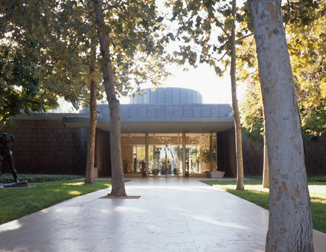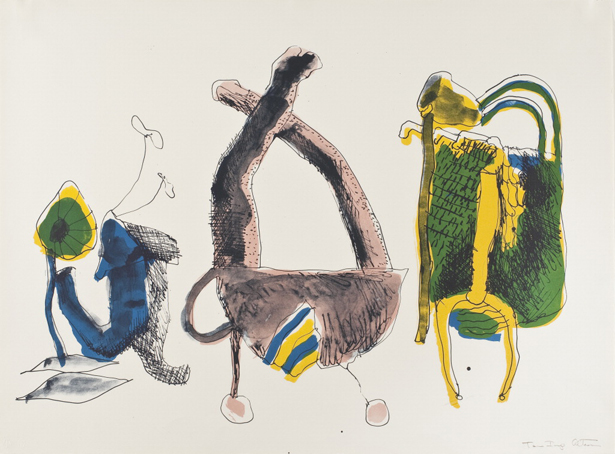
Untitled (1965)
John Altoon
A native of Los Angeles, John Altoon was a key figure in transmitting the tenets of abstract expressionism to the West Coast, and his improvisatory techniques and flowing, organic imagery helped to establish Los Angeles as a major art center in the 1950s and 1960s. He trained at several of Los Angeles’s major art schools, and after briefly working in New York as a commercial illustrator for the same agency that employed the young Andy Warhol, Altoon returned to California and became closely associated with the group of artists showing at the Ferus Gallery. Altoon became interested in printmaking during his two fellowships at the Tamarind Lithography Workshop in 1965 and 1968. There he created several series of lithographs by drawing on transfer paper placed on top of variously textured objects, including linen, cardboard, and broom bristles. These objects added texture to the images and created a sense of spontaneity during the process of art making that appealed to Altoon’s interest in experimental techniques and floating, ambiguous forms. Although Altoon’s promising career was cut short by his untimely death at age 43, his charismatic and exuberant images have made a lasting impact on California art.
Lithograph Sheet: 22 x 30 in
Norton Simon Museum, anonymous gift, 1967 © 2011 Estate of John Altoon
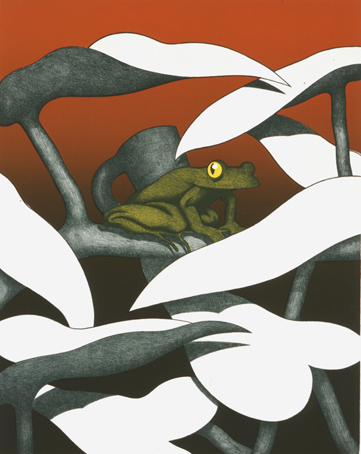
Jivaroland Frog Cup (1968)
Ken Price
Jivaroland Frog Cup was printed by Jean Milant and published by the Tamarind Lithography Workshop.
Lithograph Sheet: 22 x 16 1/2 in
Norton Simon Museum, anonymous gift © 2011 Kenneth Price
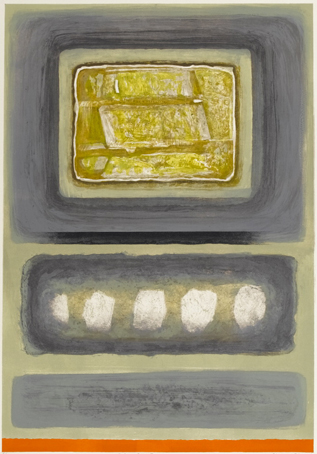
Golden Tablet (1961)
Clinton Adams
Clinton Adams was one of the great champions of American lithography. As an artist, educator, author, and printshop director, Adams was a crucial figure in the medium’s revival during the mid-twentieth century. Born in California, he studied printmaking at UCLA and worked with Lynton Kistler. In 1960 he helped found the Tamarind Lithography Workshop with June Wayne. Ten years later, the printshop relocated to the University of New Mexico and was renamed the Tamarind Institute, with Adams serving as director until 1985. At this training center for master printers, Adams actively promoted technical expertise and printing standards. In 1971 he outlined the institute’s practices in the now-standard manual, The Tamarind Book of Lithography: Art and Techniques; he also published a wide range of articles and books on the medium. Adams was equally committed to his own work, and the crisp forms and cool, bright palettes of his paintings and prints evoke California modernism. Golden Tablet was printed by Garo Antreasian and published by Tamarind Lithography Workshop.
Lithograph Sheet: 30 1/4 x 22 1/2 in
Norton Simon Museum, museum purchase, Third Biennial Print Exhibition Purchase Award, 1961 © Clinton Adams Estate
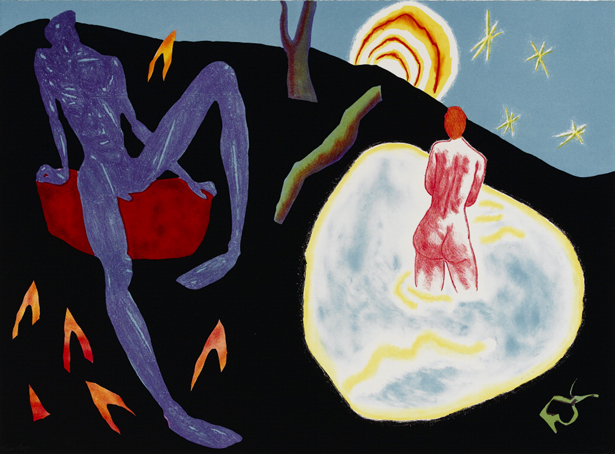
Two Figures (1966)
William Brice
After training at the Chouinard Art Institute in Los Angeles and the Art Students League in New York, William Brice established himself as a painter and educator in Southern California, where his mother had moved to pursue her career. He taught at the Jepson Art Institute in Los Angeles from 1948 to 1952, and then spent the next forty years teaching in the art department at UCLA, where his students included Judy Chicago and Edward Moses. In addition to focusing on teaching, Brice remained committed to his own work, which was initially figurative, although over time, became more abstracted. In 1962 he received a fellowship to the Tamarind Lithography Workshop, where he explored the rich tonal contrasts inherent to the medium. After 1970, his art received new inspiration during a trip to Greece. Thereafter, Brice incorporated fragments of ancient ruins and symbols of classical civilizations into his prints and paintings, while still maintaining a strong sense of pattern and light.
Lithograph Sheet: 22 x 30 in
Norton Simon Museum, anonymous gift, 1968 (c) Estate of William Brice. Courtesy of L.A. Louver, Venice, CA
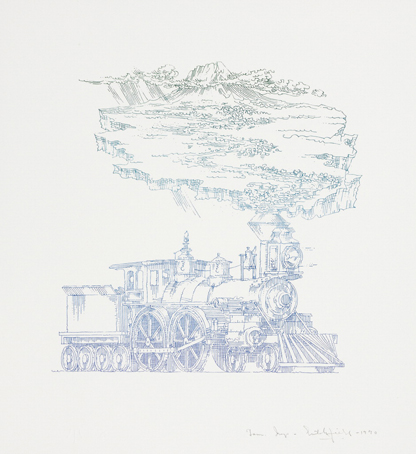
Air Land Sea XII: Narrow-Gauge Valley (1970)
William Crutchfield
William Crutchfield is a painter, sculptor, and printmaker who was an active member of the Southern California print scene during the 1960s. Born in Indianapolis, Crutchfield studied at Herron School of Art, Indianapolis, and Tulane University, New Orleans. He was awarded a Fulbright Scholarship in 1961 to study at the State Art Academy in Hamburg, Germany. After teaching at his alma mater and the Minneapolis College of Art, Crutchfield moved to California. He was a fellow at Tamarind Lithography Workshop in 1963 and 1970, and briefly worked as a printer at Gemini G.E.L. His exquisite drawings and delightful portrayals of both real-life and imaginative subjects are rendered brilliantly in his printwork. This piece was printed by S. Tracy White and published by the Tamarind Lithography Workshop.
Lithograph Sheet: 11 x 10 in
Norton Simon Museum, anonymous gift, 1972 © Copyright William Crutchfield
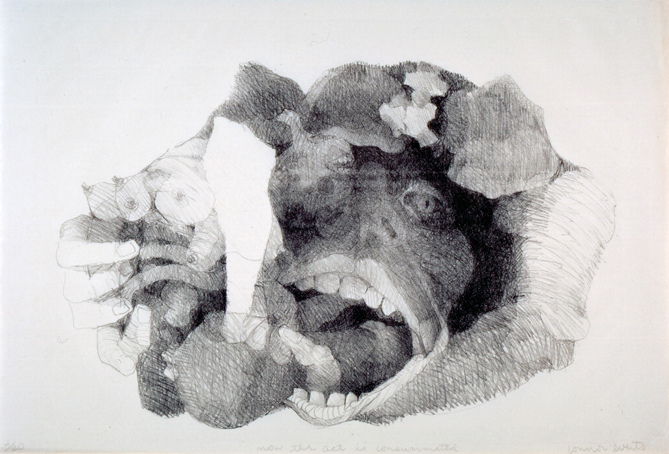
Studies in Desperation: Now the Act Is Consummated (1963)
Connor Everts
Studies in Desperation: Now the Act Is Consummated was printed by the artist, Connor Everts, and published by Quiet Sun Press.
Lithograph Sheet: 16 7/8 x 24 1/2 in
Norton Simon Museum, gift of Robin C. Park and D. Robert Park © 2011 Connor Everts
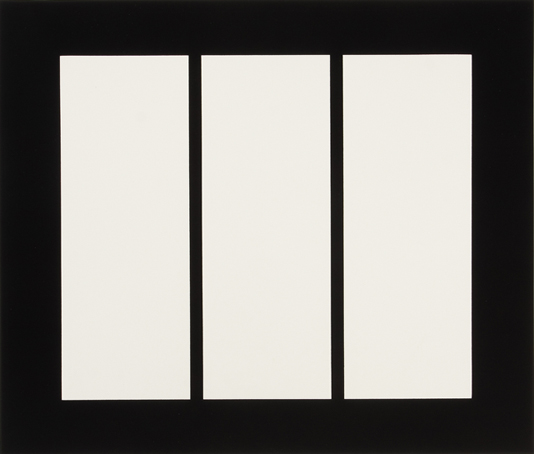
Untitled (1963)
John McLaughlin
John McLaughlin combined his interest in Asian culture with a hard-edge minimal aesthetic. During the 1930s, Boston-born McLaughlin lived in Japan, where he used his language skills to establish a career as a translator for the U.S. Army. He was also a dealer of Asian art and operated a gallery, The Tokaido, in Boston. At age fifty, McLaughlin became a full-time artist. By then living in California, he created crisp, geometric paintings that prefigured minimalism and had his first solo exhibit at the Felix Landau Gallery in 1952. In 1959 his work was included in the exhibition Four Abstract Classicists at the Los Angeles County Museum of Art, which established the California movement of hard-edge abstraction. McLaughlin applied his interest in spare forms to printmaking while a fellow at Tamarind Lithography Workshop in 1963. This piece was printed by Bohuslav Horak and Irwin Hollander, and published by the Tamarind Lithography Workshop.
Lithograph Sheet: 18 1/2 x 21 3/4 in
Norton Simon Museum, Museum Purchase, 1965
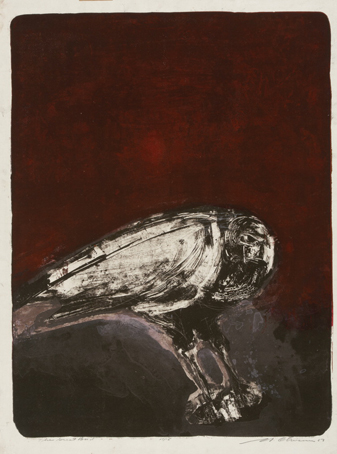
Great Bird (1957)
Nathan Oliveira
Born in Oakland, California, to Portuguese immigrants, painter, printmaker, and sculptor Nathan Oliveira was a leading member of the Bay Area figurative movement. He studied at the California College of Arts and Crafts, and Mills College, both in Oakland, where he studied under Max Beckmann in 1950. Oliveira began a lifelong focus on the human form, which he explored in a series of richly textured, expressionist figures. In 1959 his work was included in the Museum of Modern Art’s exhibit New Images of Man. Oliveira was deeply interested in the technical possibilities of printmaking, particularly monotype, and he has worked at a number of leading print shops, including Tamarind in 1963, 1975, 1982, and 1997. He taught at Stanford University from 1964 to 1995. Great Bird was printed and published by the artist
Lithograph Sheet (variable): 28 1/4 x 20 3/4 in
Norton Simon Museum, Print Festival Purchase Fund, 1958 © Estate of Nathan Oliveira
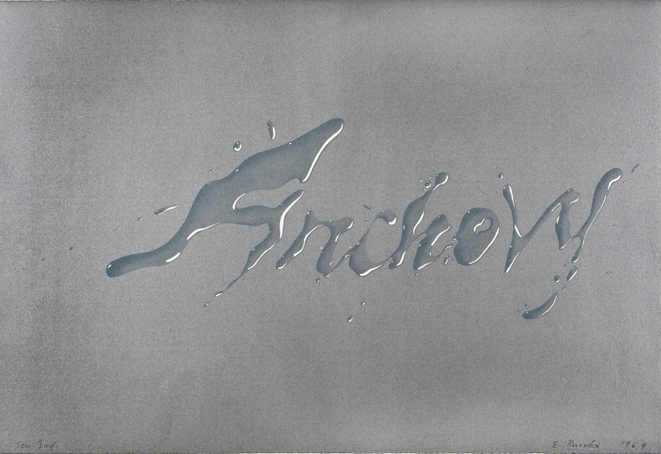
Anchovy (1969)
Ed Ruscha
Ed Ruscha's Anchovy was printed by Serge Lozingot and published by the Tamarind Lithography Workshop.
Lithograph Sheet: 19 1/8 x 28 1/4 in
Norton Simon Museum, anonymous gift © Ed Ruscha
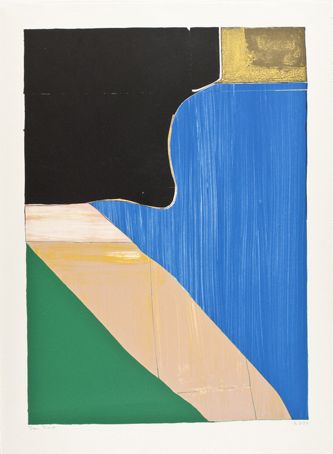
Untitled (1970)
Richard Diebenkorn
Richard Diebenkorn's lithograph was printed by David Trowbridge and published by the Tamarind Lithography Workshop.
Lithograph 30 x 22 in
Norton Simon Museum, anonymous gift, 1972 © Estate of Richard Diebenkorn
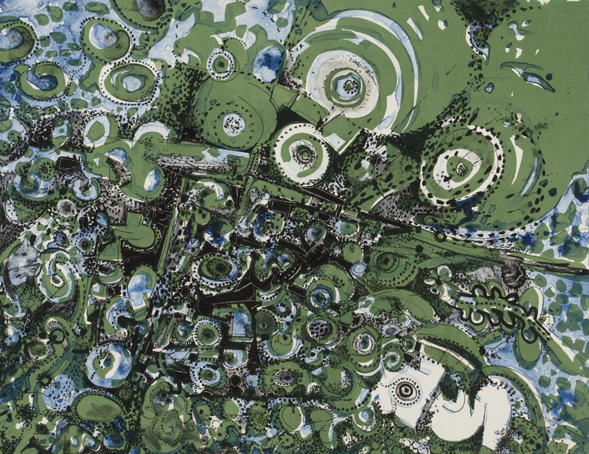
Sleeping Gypsy (1964)
Lee Mullican
Sleeping Gypsy was printed by Ernest Rosenthal and published by the Tamarind Lithography Workshop.
Lithograph 20 x 25 3/4 in
Norton Simon Museum, anonymous gift © Estate of Lee Mullican
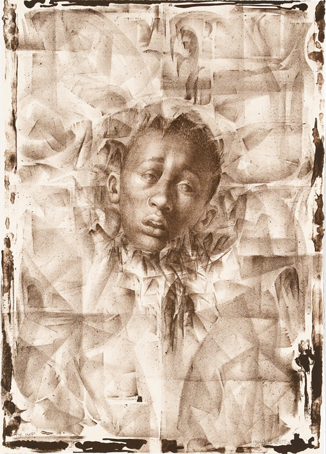
Wanted Poster Series, #11 (1970)
Charles White
Printed by Larry Thomas, this lithograph from the Wanted Poster Series by Charles White was published by the Tamarind Lithography Workshop.
Lithograph 22 1/2 x 16 in
Norton Simon Museum, anonymous gift, 1972 © 1970 The Charles White Archives


